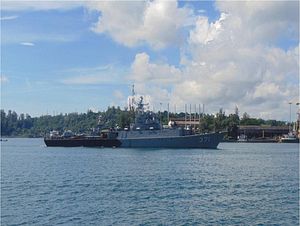On September 5, India’s External Affairs Minister S. Jaishankar visited Indonesia and met Indonesian Foreign Minister Retno Marsudi. The visit marked slightly more than a year since Prime Minister Narendra Modi’s visit to Indonesia in May 2018 and President Joko “Jokowi” Widodo’s visit to India on 12 December 2016.
These back-and-forth visits by the leadership of both countries in recent years seem to indicate a bilateral commitment to deepen relations beyond the nostalgia and reminiscence of the 1955 Bandung Conference and shared historical and cultural ties. Indeed, growing bilateral ties and the personal rapport between the two pragmatic, popular statesmen — both democratically re-elected recently — signal a gradual shift in the ties between the two Indo-Pacific countries.
Burgeoning bilateral ties have been shaped first and foremost by national economic interests. During the September 5 meeting, the two foreign ministers ambitiously pledged to triple bilateral trade to $50 billion by 2025. Indeed, economic and trade cooperation between the world’s most populous (India) and fourth most populous (Indonesia) nations can be mutually beneficial. Both countries not only have large Muslim populations that are able to cooperate to increase their share of the global halal food industry but also enjoy comparative advantages in engineering products, pharmaceuticals, biotechnology, health care, auto and auto-component industries, and IT services (India) and palm oil, coal and natural resource value-added processing (Indonesia).
Growing economic interests provide a strong foundation for cooperation in the maritime domain. Both countries are major maritime entities and want to preserve a stable maritime environment which is essential to realize their domestic, regional, as well as global aspirations. While Jokowi seeks to reinvigorate Indonesia as a major maritime power through his Global Maritime Fulcrum, Modi has articulated his strategic vision as SAGAR (Security and Growth for all in the Region) and had been signing naval logistical agreements with various Indian Ocean countries.
In May 2018, Modi and Jokowi announced their “Shared Vision of India-Indonesia Maritime Cooperation in the Indo-Pacific.” The Shared Vision articulated common goals to improve maritime connectivity between the Andaman and Nicobar Islands and Sumatra, as well as developing the marine resources of both countries. Furthermore, it underscored their mutual agreement to strengthen the existing security architecture anchored in ASEAN mechanisms and undertook concrete measures to promote peace and security in the region, such as the commencement of regular bilateral naval exercises. Mutual recognition of shared interests and challenges on the maritime domain had played a key role in driving the two countries closer together.
The converging interests in the maritime domain between India and Indonesia are varied but clear. Both countries share a range of concerns, from the development of sustainable maritime economy to emerging non-traditional security threats. And both countries, like the rest of the Indo-Pacific, are also contending with the rise of China and growing Chinese assertiveness in the South China Sea and the Indian Ocean.
In May 2018, during Modi’s visit to Indonesia, both countries agreed on ways to boost cooperation within their comprehensive strategic partnership. They agreed mainly on six broad areas – enhancing trade and invest cooperation; promoting sustainable development of marine resources; expanding cooperation in disaster risk management; fostering tourism and cultural exchanges; promoting maritime safety and security; and strengthening academic, science and technology cooperation. This itself has provided a good agreed framework of priorities for both countries.
To that framework has now been added more impetus and momentum. The reelection of Modi and Jokowi this year paves the way for continuity in moving forward with that agreed framework, providing an opportunity for following up on agreed visions and taking concrete steps. An environment of rising great power competition between the United States and China also incentivizes other powers such as India and Indonesia to deepen cooperation among themselves.
The past seven decades of India-Indonesia relationship has underlined the fact that shared history and goodwill are necessary but not sufficient conditions for a productive relationship. Now, there is a better understanding of converging economic and strategic interests and intents. Political connectivity seems to create enabling environment to accomplish comprehensive strategic partnership objectives. A purposeful economic and strategic engagement and timely implementation of the agreed framework will be the key to the next phase of this relationship.
Rajeev Ranjan Chaturvedy is a Visiting Fellow, South Asia Program, and Jefferson Ng is a Senior Analyst, Indonesia Program, at the S. Rajaratnam School of International Studies (RSIS), Nanyang Technological University, Singapore.

































